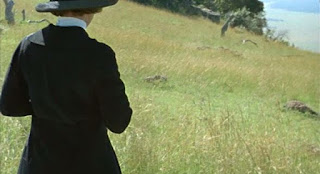Love Story (Arthur Hiller, 1970) What can you say about a 50 year old movie that manages to stay alive, despite being so much of its time? That it's maudlin, and saccharin, completely apolitical in a time of radicals, shamelessly tear-jerky, and ridiculously dishonest in its treatment of disease? That its success was completely manufactured by a marketing strategy so Machiavellian that it belied any of the inspiration that might go along with a phenomenon? That, what looked like a delicate butterfly to those enthralled with it, actually more resembled one of Disney's hippoes in a tutu.
Yeah, yeah. But, damn it, it works. (sob!)
At least, it did on me when it was first released.
Truth is, Love Story started as a screenplay that Erich Segal sold to Paramount. Producer Robert Evans (to whom the credit for its success must assuredly go, as it was, literally, "a labor of love" for his then girl-friend Ali MacGraw). It was a low-budget film with no "buzz" and Segal was encouraged to write a "tie-in" novel to help boost its caché. Released on Valentine's Day, and bolstered by studio-engineered "block-buying," it made the New York Times Bestseller List, and, being slight and written in a punchy, simple style, mushroomed to become a "thing." The success of the movie was almost a sure-thing.
With the passage of time, the "phenom" aspect of it has disappeared and one can look at it without much prejudice. Arthur Hiller's direction is largely inelegant, combining a "caught-on-the-fly" feeling that was popular in the motorcycle-wake of Easy Rider (but without the pretentious editing tricks) with television style blocking. The film hinges on a score by Francis Lai (A Man and a Woman) that is used for a few "frolic-in-love" scenes. The acting varies in quality from professional turns by veterans Ray Milland and John Marley to the "do as little as possible and just be sincere" performance by Ryan O'Neal, and a functional one by Ali MacGraw, that started to show the cracks in her abilities that weren't apparent in Goodbye, Columbus.*
Still, it jerks tears...if one has lost or (and probably more importantly) if one has not. Imagined grief can sometimes be more powerful than the actual if one lives in a fantasy-world. Anyone who has lost someone to a lingering disease will be a bit perplexed by this aspect of Love Story and could righteously yell "bullshit." Roger Ebert went so far as to call what heroine Jenny succumbs to as "Ali MacGraw Disease" ("Movie illness in which the only symptom is that the sufferer grows more beautiful as death approaches"). Movie Magic in Hollywood. "She's going. I need pancake make-up STAT"
But, the part the most galling aspect of Love Story—The Book! The Movie! The Phenomenon!—to me, personally, is its bracketing tag-line—"Love means never having to say you're sorry"—which would make a great Hallmark card if it wasn't such crap.** It would be easy if love meant never having to say you're sorry (certainly, it would be nice if it meant never having to say you're sorry that you've loved!) But the fact of the matter is that, if you're doing it right...or wrong...love really means saying you're sorry. It's common courtesy. And hopefully, you learn from having to say it, to change the behavior that demands an apology. Love cares. Love accommodates. Love humbles. And ('cause the Bible tells us so) love never dies.
Not in the real world.
Sorry.
* MacGraw and O'Neal were nominated for Oscars for Best Lead Performances that season, which seems less to do with merit than with studio electioneering. The film was nominated for 7 Academy Awards, but only won one...for Lai's score. It was Patton's year that year (and I'd argue that Jerry Goldsmith's lean score for that film has had more importance, both to its film and the legacy of film music, than Lai's). But, in a year of Patton, Five Easy Pieces and M*A*S*H, Woodstock, Let It Be, The Great White Hope, Women in Love, and Ryan's Daughter, it's a little difficult to see how Love Story could compete on any level.
** Just found an article where even MacGraw says "it makes no sense."
 |
| From Peter Bogdanovich's What's Up, Doc? |
























































































































